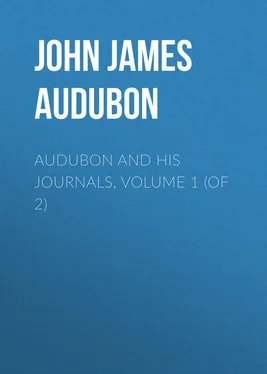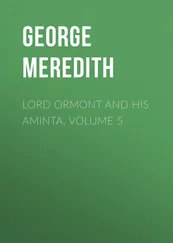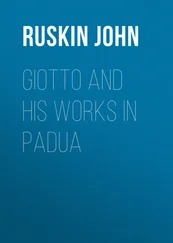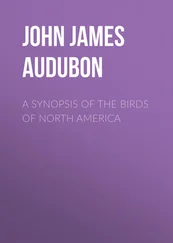John Audubon - Audubon and his Journals, Volume 1 (of 2)
Здесь есть возможность читать онлайн «John Audubon - Audubon and his Journals, Volume 1 (of 2)» — ознакомительный отрывок электронной книги совершенно бесплатно, а после прочтения отрывка купить полную версию. В некоторых случаях можно слушать аудио, скачать через торрент в формате fb2 и присутствует краткое содержание. Жанр: foreign_antique, foreign_prose, на английском языке. Описание произведения, (предисловие) а так же отзывы посетителей доступны на портале библиотеки ЛибКат.
- Название:Audubon and his Journals, Volume 1 (of 2)
- Автор:
- Жанр:
- Год:неизвестен
- ISBN:нет данных
- Рейтинг книги:5 / 5. Голосов: 1
-
Избранное:Добавить в избранное
- Отзывы:
-
Ваша оценка:
- 100
- 1
- 2
- 3
- 4
- 5
Audubon and his Journals, Volume 1 (of 2): краткое содержание, описание и аннотация
Предлагаем к чтению аннотацию, описание, краткое содержание или предисловие (зависит от того, что написал сам автор книги «Audubon and his Journals, Volume 1 (of 2)»). Если вы не нашли необходимую информацию о книге — напишите в комментариях, мы постараемся отыскать её.
Audubon and his Journals, Volume 1 (of 2) — читать онлайн ознакомительный отрывок
Ниже представлен текст книги, разбитый по страницам. Система сохранения места последней прочитанной страницы, позволяет с удобством читать онлайн бесплатно книгу «Audubon and his Journals, Volume 1 (of 2)», без необходимости каждый раз заново искать на чём Вы остановились. Поставьте закладку, и сможете в любой момент перейти на страницу, на которой закончили чтение.
Интервал:
Закладка:
September 9. Dr. Traill has ordered all my drawings to be packed by the curator of the Institution, so that has given me no trouble whatever. It is hard to say farewell to all those in town and country who have been so kind, so hospitable to me, but to-morrow I leave for Manchester, where Mr. Roscoe advises me to go next.
Manchester, County of Lancashire, September 10, 1826. I must write something of my coming here. After bidding adieu to many friends, I went to Dr. Traill, who most kindly insisted on my taking Mr. Munro with me for two days to assist me, and we left by coach with my portfolios, my trunk to follow by a slower conveyance. I paid one pound for our inside seats. I felt depressed at leaving all my good friends, yet Mr. Munro did all in his power to interest me. He made me remark Lord Stanley's domains, and I looked on the Hares, Partridges, and other game with a thought of apprehension that the apparent freedom and security they enjoyed was very transient. I thought it more cruel to permit them to grow tame and gentle, and then suddenly to turn and murder them by thousands, than to give them the fair show that our game has in our forests, to let them be free and as wild as nature made them, and to let the hunter pay for them by the pleasure and work of pursuing them. We stopped, I thought frequently, to renew the horses, and wherever we stopped a neatly dressed maid offered cakes, ale, or other refreshments for sale. I remarked little shrubs in many parts of the meadows that concealed traps for moles and served as beacons for the persons who caught them. The road was good, but narrow, the country in a high degree of cultivation. We crossed a canal conducting from Liverpool here; the sails moving through the meadows reminded me of Rochester, N.Y. I am, then, now at Manchester, thirty-eight miles from Liverpool, and nearly six thousand from Louisiana.
Manchester, September 12. Yesterday was spent in delivering my letters to the different persons to whom I was recommended. The American consul, Mr. J. S. Brookes, with whom I shall dine to-morrow, received me as an American gentleman receives another, most cordially. The principal banker here, Arthur Heywood, Esq., was equally kind; indeed everywhere I meet a most amiable reception. I procured, through these gentlemen, a good room to exhibit my pictures, in the Exchange buildings, had it cleared, cleaned, and made ready by night. At five this morning Mr. Munro (the curator of the Institution at Liverpool and a most competent help) with several assistants and myself began putting up, and by eleven all was ready. Manchester, as I have seen it in my walks, seems a miserably laid out place, and the smokiest I ever was in. I think I ought not to use the words "laid out" at all. It is composed of an astonishing number of small, dirty, narrow, crooked lanes, where one cart can scarce pass another. It is full of noise and tumult; I thought last night not one person could have enjoyed repose. The postilion's horns, joined to the cry of the watchmen, kept my eyelids asunder till daylight again gave me leave to issue from the King's Arms. The population appears denser and worse off than in Liverpool. The vast number of youth of both sexes, with sallow complexions, ragged apparel, and downcast looks, made me feel they were not as happy as the slaves of Louisiana. Trade is slowly improving, but the times are dull. I have heard the times abused ever since my earliest recollections. I saw to-day several members of the Gregg family.
September 13, Wednesday. I have visited the Academy of Sciences; my time here was largely spoiled by one of those busybodies who from time to time rise to the surface, – a dealer in stuffed specimens, and there ends his history. I wished him in Hanover, or Congo, or New Zealand, or Bombay, or in a bomb-shell en route to eternity. Mr. Munro left me to-day, and I removed from the hotel to the house of a Mrs. Edge, in King Street, who keeps a circulating library; here I have more quietness and a comfortable parlor and bedroom. I engaged a man named Crookes, well recommended, to attend as money receiver at the door of my exhibition room. I pay him fifteen shillings per week; he finds himself, and copies letters for me. Two men came to the exhibition room and inquired if I wished a band of music to entertain the visitors. I thanked them, but do not consider it necessary in the company of so many songsters. My pictures here must depend on their real value; in Liverpool I knew I was supported by my particular friends… It is eleven o'clock, and I have just returned from Consul Brookes' dinner. The company were all gentlemen, among whom were Mr. Lloyd, the wealthy banker, and Mr. Garnet. Our host is from Boston, a most intelligent and polite man. Judge of my surprise when, during the third course, I saw on the table a dish of Indian corn, purposely for me. To see me eat it buttered and salted, held as if I intended gagging myself, was a matter of much wonder to the English gentlemen, who did not like the vegetable. We had an English dinner Americanized, and the profusion of wines, and the quantity drank was uncomfortable to me; I was constantly obliged to say, "No." The gentleman next me was a good naturalist; much, of course, was said about my work and that of Charles Bonaparte. The conversation turned on politics, and Mr. Brookes and myself, the only Americans present, ranged ourselves and toasted "Our enemies in war, but our friends in peace." I am particularly fond of a man who speaks well of his country, and the peculiar warmth of Englishmen on this subject is admirable. I have had a note from Lord de Tabelay, who is anxious to see my drawings and me, and begs me to go to his domain fourteen miles distant, on my way to Birmingham. I observed that many persons who visited the exhibition room investigated my style more closely than at Liverpool. A Dr. Hulme spent several hours both yesterday and to-day looking at them, and I have been asked many times if they were for sale. I walked some four miles out of the town; the country is not so verdant, nor the country seats so clean-looking, as Green Bank for instance. The funnels raised from the manufactories to carry off the smoke appear in hundreds in every direction, and as you walk the street, the whirring sound of machinery is constantly in your ears. The changes in the weather are remarkable; at daylight it rained hard, at noon it was fair, this afternoon it rained again, at sunset was warm, and now looks like a severe frost.
September 14, Thursday. I have dined to-day at the home of Mr. George W. Wood, about two miles from the town. He drove me thither in company with four gentlemen, all from foreign countries, Mexico, Sumatra, Constantinople, and La Guayra; all were English and had been travelling for business or pleasure, not for scientific or literary purposes. Mrs. Wood was much interested in her gardens, which are very fine, and showed me one hundred bags of black gauze, which she had made to protect as many bunches of grapes from the wasps.
September 15. Frost. This morning the houses were covered with frost, and I felt uncommonly cold and shivery. My exhibition was poorly attended, but those who came seemed interested. Mr. Hoyle, the eminent chemist, came with four very pretty little daughters, in little gray satin bonnets, gray silk spencers, and white petticoats, as befitted them, being Quakers; also Mr. Heywood, the banker, who invited me to dine next Sunday. I spent the evening at the Rev. James I. Taylor's, in company with himself, his wife, and two gentlemen, one a Parisian. I cannot help expressing my surprise that the people of England, generally speaking, are so unacquainted with the customs and localities of our country. The principal conversation about it always turns to Indians and their ways, as if the land produced nothing else. Almost every lady in England draws in water-colors, many of them extremely well, very much better than I ever will do, yet few of them dare to show their productions. Somehow I do not like Manchester.
Читать дальшеИнтервал:
Закладка:
Похожие книги на «Audubon and his Journals, Volume 1 (of 2)»
Представляем Вашему вниманию похожие книги на «Audubon and his Journals, Volume 1 (of 2)» списком для выбора. Мы отобрали схожую по названию и смыслу литературу в надежде предоставить читателям больше вариантов отыскать новые, интересные, ещё непрочитанные произведения.
Обсуждение, отзывы о книге «Audubon and his Journals, Volume 1 (of 2)» и просто собственные мнения читателей. Оставьте ваши комментарии, напишите, что Вы думаете о произведении, его смысле или главных героях. Укажите что конкретно понравилось, а что нет, и почему Вы так считаете.












